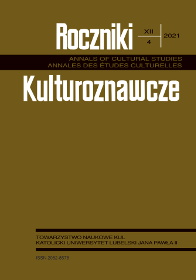The Role of the Court of Justice in Creating Standards for the Implementation of Cultural Rights
Abstract
The present study seeks to answer the question whether the case law of the Court of Justice of the European Union in cases concerning the exercise of broadly understood cultural policies may in reality affect the extent of implementation of cultural rights—that is, access to products of culture, participation in cultural life and freedom of artistic creativity—at the level of Member States. Cultural rights are traditionally regulated by the constitutions of EU Member States and are classified by legal scholars and commentators as second generation rights. Culture, in turn, according to primary legislation of the European Union, is only a supporting competence (Article 6 of the Treaty on the Functioning of the European Union). However, a review of the Court’s case law demonstrates that CJEU’s judgments form standards that contribute to a more effective implementation of cultural rights guaranteed in the national law of the Member States and international agreements to which they are parties. This results from the nature of the Union’s law, which penetrates a national system and thanks to the principle of direct effect and supremacy truly affects the situation of EU citizens.
References
Azoulai, Loic, and Renaud Dehousse. “The European Court of Justice and the Legal Dynamics of Integration.” In The Oxford Handbook of the European Union, edited by Erik Jones, Anand Menon, and Stephen Weatherhill, 350–64. Oxford: Oxford University Press, 2012.
Craufurd Smith, Rachael. “The Evolution of the Cultural Policy in the European Union.” In The Evolution of the EU Law, 2nd ed., edited by Paul P. Craig and Grainne De Burca, 869–94. Oxford: Oxford University Press, 2011.
Cultural Rights in the Case-Law of the European Court of Human Rights. Council of Europe, European Court of Human Rights, 2011.
de Witte, Bruno. “Direct Effect, Primacy and the Legal Nature of the Legal Order.” In The Evolution of the EU Law, 2nd ed., edited by Paul. P Craig and Grainne De Burca. Oxford: Oxford University Press, 2011.
European Court of Human Rights. Cultural Rights in the Case-Law of the European Court of Human Rights. Council of Europe, European Court of Human Rights, 2011.
Foster, Nigel. Foster on EU Law. Oxford: Oxford University Press, 2006.
Frankiewicz, Anna. “Konstytucyjna regulacja dostępu do dóbr kultury i wolności korzystania z kultury.” Przegląd Prawa Konstytucyjnego, no. 3 (2013): pp. 57–77.
Frankiewicz-Bodynek, Anna. Konstytucyjna regulacja dziedzictwa narodowego oraz dóbr kultury. Toruń: Adam Marszałek, 2019.
Isin, Engin F. “Claiming European Citizenship.” In Enacting European Citizenship, edited by Engin F. Isin and Michael Saward, 19–46. Cambridge: Cambridge University Press, 2013.
Jurkiewicz-Eckert, Dorota. “Cultural Policy of the EU – How it Works in Practice.” In Milczarek, Adamczyk, and Zajączkowski, Introduction to European Studies, 729–62. Warszaw: University of Warsaw, 2013.
Jurkiewicz-Eckert, Dorota. “Rethinking Europe through Culture.” In Milczarek, Adamczyk, and Zajączkowski, Introduction to European Studies, 703–28. Warsaw: University of Warsaw, 2013.
Kęskiewicz, Anna. “Specyfika określenia desygnatów nazwowych dóbr o szczególnym znaczeniu dla kultury na gruncie prawnym.” Zeszyty Naukowe Uniwersytetu Rzeszowskiego, Seria Prawnicza 101 (2018): 239–47.
Kosińska, Anna M. Kulturalne prawa człowieka. Lublin: Wydawnictwo KUL, 2014.
Kosińska, Anna M. Prawa kulturalne obywateli państw trzecich w prawie Unii Europejskiej, 160, as quoted in: Anna Siwek-Ślusarek, “Komentarz do art. 167 TFUE,” in Traktat o funkcjonowaniu Unii Europejskiej. Komentarz, vol. 2, edited by Krystyna Kowalik-Bańczyk, Monika Szwarc-Kuczer, and Andrzej Wróbel, articles 90–222. Warsaw: Wolters Kluwer, 2012, LEX electronic version.
Kosińska, Anna M. Prawa kulturalne obywateli państw trzecich. Lublin: Wydawnictwo KUL, 2018.
Marcisz, Paweł. Koncepcja tworzenia prawa przez Trybunał Sprawiedliwości Unii Europejskiej. Warsaw: Wolters Kluwer, 2015.
Milczarek, Dariusz, Artur Adamczyk, and Kamil Zajączkowski (eds.). Introduction to European Studies: A New Approach to Uniting Europe. Warsaw: Centre for Europe, University of Warsaw, 2013.
Młynarska-Sobaczewska, Anna. “Prawo do kultury w katalogu praw człowieka.” Przegląd Prawa Konstytucyjnego 3 (2013): 27–55.
Niedźwiedź, Monika. “Obrót dobrami kultury w Unii Europejskiej – konsekwencje dla Polski.” Kultura Współczesna 40, no. 2 (2004): 122.
Piris, Jean-Claude. The Lisbon Treaty and Political Analysis. Cambridge Studies in European Union Law. New York: Cambridge University Press, 2011.
Serzhanova, Viktoriya, and Jan Plis. “Ochrona dziedzictwa narodowego jako przesłanka ograniczenia swobód rynku wewnętrznego UE.” Studia Europejskie – Studies in European Affairs, no. 4 (2017): 141–61.
Skomerska-Muchowska, Izabela. “Kultura.” In Polityki Unii Europejskiej: polityki społeczne. Aspekty prawne, edited by Jan Barcz, 64–88. Warsaw: Instytut Wydawniczy EuroPrawo, 2010.
Sobczak, Witold. “Ochrona dziedzictwa kultury w systemie prawnym Unii Europejskiej.” Środkowoeuropejskie Studia Polityczne, no. 3 (2009): 105–23.
United Nations Organization. International Covenant on Economic, Social and Cultural Rights (opened for signature at New York on 19 December 1966). Treaty series 993.





